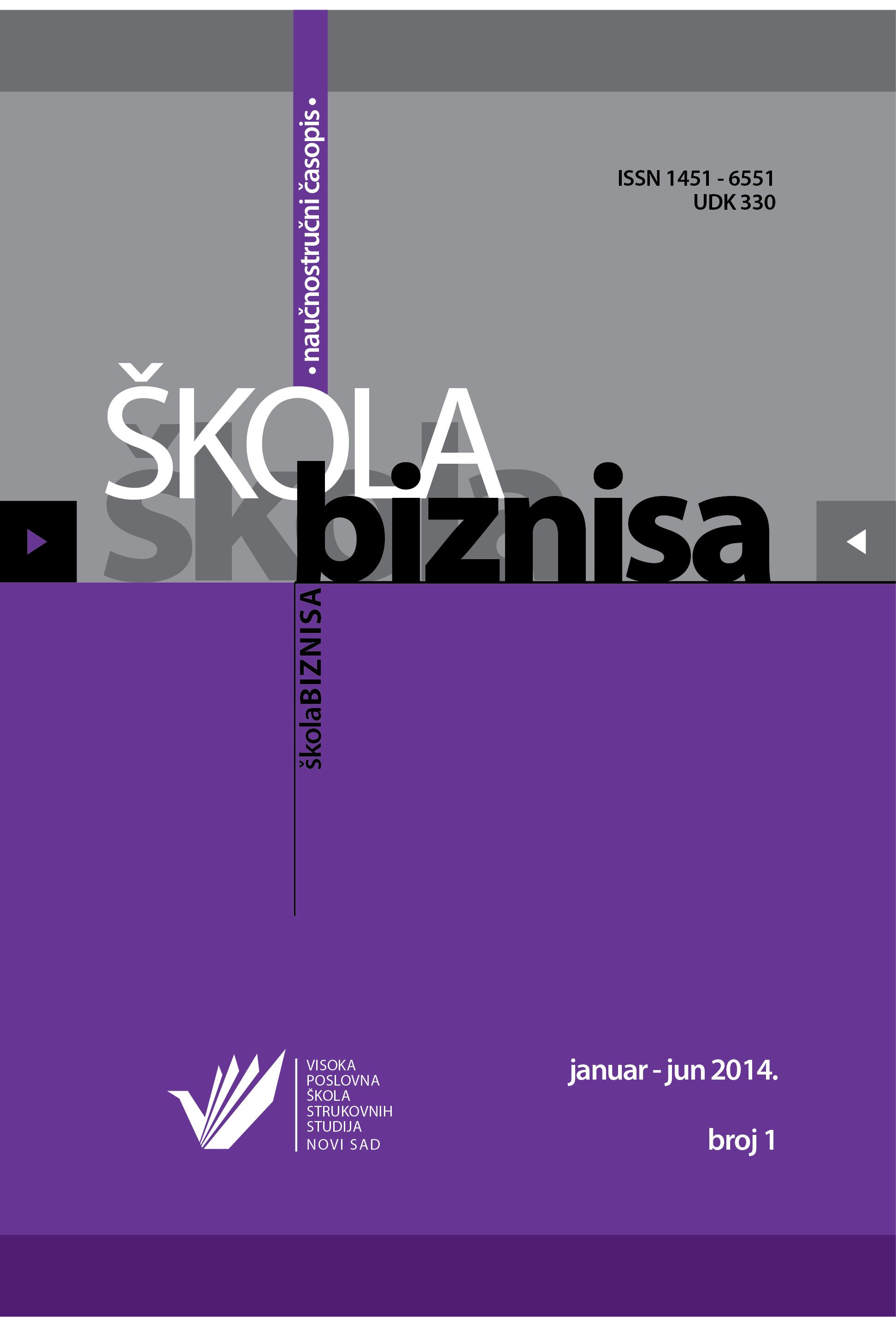RELEVANCE OF FREE CASH FLOW AS A MEASURE OF GENERATING VALUE FOR OWNERS
Abstract
In the new economy or knowledge economy the main goal of any company should be directed towards the achievement of the business in the interest of the owners, or generating the value for owners. In dynamic business environment, an effective performance measurement system is key determinant of successful implementation of corporate strategy, growth and survival of the company. Modern performance measures should provide an accurate assessment of the intrinsic value of the company, as well as the value for the owners (shareholders). The essence is maximizing the immanent or guaranteed value of the company. The immanent value is the value of a company based on internal evaluation (assessment discounted cash flows or expected cash flow in the future) by the management team. Corporate managers in Serbia are facing the challenge of increasingly efficient capital markets and the competition in the future, which requires the implementation of a value oriented corporate governance, therefore this paper presents FCF (Free Cash Flow) methodology of valuation. Free cash flow (FCF) is the amount of cash available for owners of the company after the necessary investments in fixed assets and working capital to maintain the current scope of activities and support to planning.
References
Bešlić, I., & Bešlić, D. (2010). Merenje performansi u proizvodnom preduzeću kao izvor konkurentske prednosti. Ekonomika poljoprivrede, 57(2), 313–326.
Copeland, T., & Dolgoff, A. (2005). Outperform with Expectations – Based Management. USA: John Wiley & Sons, Inc.
Damodaran, A. (2002). Investment Valuation: Tools and Technicues for Determining the Value of any Asset. New York: Wiley.
Čupić, M. (2010). Ocena značaja četiri varijante rezidualnog dobitka za ostvarenje cilja maksimiziranja vrednosti za akcionare. Ekonomski horizonti, 12(2), 113–132.
Hejazi, R., & Oskouei, M. M. (2007). The Information Content of Cash Value Added (CVA) and P/E Ratio: Evidence on Association with Stock Returns for Industrial Companies in the Tehran Stock Exchange. Iranian Accounting & Auditing Review, 14(47), 21–36.
Evans, H. M. (1999). Excellence in Financial Management: Course 8: Creating Value through Financial Management. Preuzeto sa http://www.exinfm.com/training/pdfiles/course08.pdf.
McClure, B. (2010). Free Cash Flow: Free, but Not Always Easy. Preuzeto sa http://www.investopedia.com/articles/fundamental/03/091703.asp.
Peterson, D. P. Florida Atlantic University. Preuzeto sa http://educ.jmu.edu/~drakepp/general/FCF.pdf.
Savez računovođa i revizora Srbije. (2007). Međunarodni standardi finansijskog izveštavanja (IFRS). Beograd.
Schweser, K. (2008). Free Cash Valuation. Preuzeto sa http://homes.ieu.edu.tr/hbaklaci/itf414/valuation/valuationnotes1.pdf.
Stančić, P. (2005). Neophodne modifikacije bilansa stanja i bilansa uspeha za potrebe upravljanja finansijama preduzeća. Ekonomske teme, 43(5), 137–147.
Stern School of Business. Firm Valuation: Cost of Capital and APV Approaches. Preuzeto sa http://pages.stern.nyu.edu/~adamodar/pdfiles/valn2ed/ch15.pdf.
Van Horne, C. J., & Wachowicz, J. R. M. J. (2007). Osnovi finansijskog menadžmenta. Beograd: Data Status.
Zakić, V. (2011). Merenje performansi – savremeni koncepti. U: Zbornik radova, 42. Simpozijum – Računovodstvo, poslovne finansije u savremenim uslovima poslovanja. Zlatibor: Savez računovođa i revizora Srbije, 243-267.
Zakić, V. (2012). Metodologija obračuna i računovodstvene modifikacije u okviru EVA koncepta. Računovodstvo, 1–2, 31–45.
Zakić, V. (2013). Generisanje vrednosti za zainteresovane subjekte kao cilj savremenog korporativnog preduzeća. Zbornik Matice srpske za društvene nauke, 144(3), 467–481.
- Authors retain copyright and grant the journal right of first publication with the work simultaneously licensed under a Creative Commons Attribution License that allows others to share the work with an acknowledgement of the work's authorship and initial publication in this journal.
- Authors are able to enter into separate, additional contractual arrangements for the non-exclusive distribution of the journal's published version of the work (e.g., post it to an institutional repository or publish it in a book), with an acknowledgement of its initial publication in this journal.
- Authors are permitted and encouraged to post their work online (e.g., in institutional repositories or on their website) prior to and during the submission process, as it can lead to productive exchanges, as well as earlier and greater citation of published work (See The Effect of Open Access).

